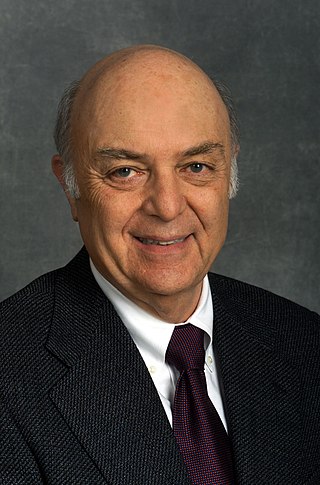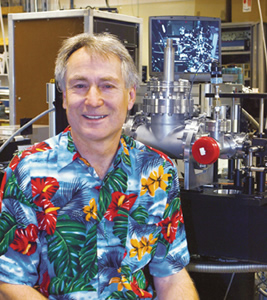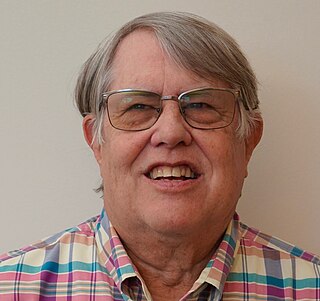
Armand Paul Alivisatos is an American chemist and academic administrator who has served as the 14th president of the University of Chicago since September 2021. He is a pioneer in nanomaterials development and an authority on the fabrication of nanocrystals and their use in biomedical and renewable energy applications. He was ranked fifth among the world's top 100 chemists for the period 2000–2010 in the list released by Thomson Reuters.

Marvin Lou Cohen is an American–Canadian theoretical physicist. He is a physics professor at the University of California, Berkeley. Cohen is a leading expert in the field of condensed matter physics. He is widely known for his seminal work on the electronic structure of solids.

Richard James Saykally is an American chemist. He is currently the Class of 1932 Endowed Professor of Chemistry at the University of California, Berkeley. He has received numerous awards for his research on the molecular characteristics of water and aqueous solutions.
Nathan S. Lewis is the George L. Argyros Professor of Chemistry at the California Institute of Technology (Caltech). He specializes in functionalization of silicon and other semiconductor surfaces, chemical sensing using chemiresistive sensor arrays, and alternative energy and artificial photosynthesis.

Alex Zunger is a theoretical physicist, research professor, at the University of Colorado Boulder. He has authored more than 150 papers in Physical Review Letters and Physical Reviews B Rapid Communication, has an h-index over 150, number of citations over 113,000. He co-authored one of the top-five most cited papers ever to be published in the Physical Review family in its over 100 years' history.
Naomi Shauna Ginsberg is a Canadian electrical engineer, physicist, and scientist. She is currently an associate professor of chemistry at the University of California, Berkeley.

James R. Chelikowsky is a professor of physics, chemical engineering, and chemistry at The University of Texas at Austin. He is the director of the Institute for Computational Engineering and Sciences' Center for Computational Materials. He holds the W.A. "Tex" Moncrief Jr. Chair of Computational Materials.
Ramamoorthy Ramesh is an American materials scientist of Indian descent who has contributed to the synthesis, assembly and understanding of complex functional oxides, such as ferroelectric materials. In particular, he has worked on the development of ferroelectric perovskites, manganites with colossal magnetoresistance, and also on multiferroic oxides with potential benefits for modern information technologies.

Gerbrand Ceder is a Belgian–American scientist who is a professor and the Samsung Distinguished Chair in Nanoscience and Nanotechnology Research at the University of California, Berkeley. He has a joint appointment as a senior faculty scientist in the Materials Sciences Division of Lawrence Berkeley National Laboratory. He is notable for his pioneering research in high-throughput computational materials design, and in the development of novel lithium-ion battery technologies. He is co-founder of the Materials Project, an open-source online database of ab initio calculated material properties, which inspired the Materials Genome Initiative by the Obama administration in 2011. He is also the Founder and was CTO of Pellion Technologies, which aims to commercialize magnesium-ion batteries. In 2017 Gerbrand Ceder was elected a member of the National Academy of Engineering, "For the development of practical computational materials design and its application to the improvement of energy storage technology."

Brent Fultz is an American physicist and materials scientist and one of the world's leading authorities on statistical mechanics, diffraction, and phase transitions in materials. Fultz is the Barbara and Stanley Rawn Jr. Professor of Applied Physics and Materials Science at the California Institute of Technology. He is known for his research in materials physics and materials chemistry, and for establishing the importance of phonon entropy to the phase stability of materials. Additionally, Fultz oversaw the construction of the wide angular-range chopper spectrometer (ARCS) instrument at the Spallation Neutron Source and has made advances in phonon measuring techniques.
Ali Javey is a professor of electrical engineering and computer sciences at the University of California, Berkeley, a senior faculty scientist at the Lawrence Berkeley National Laboratory, and co-director of the Bay Area Photovoltaic Consortium and the Berkeley Sensor and Actuator Center. His research is focused on materials and device innovation for technological applications, particularly photovoltaics, wearable sensors, nanoelectronics, and programmable materials.
Ju Li is an American scientist, engineer, and currently the Battelle Energy Alliance Professor of Nuclear Science and Engineering and Materials Science and Engineering at Massachusetts Institute of Technology. A highly cited expert in his field, he is also a Fellow of the Materials Research Society and American Physical Society.
Prashant Jain is an Indian-born American scientist and a professor of chemistry at the University of Illinois Urbana–Champaign where his research laboratory studies the interaction of light with matter, designs nanoparticle catalysts, and develops methods for mimicking plant photosynthesis. He is a Fellow of the American Association for the Advancement of Science and the Royal Society of Chemistry, a TR35 inventor, a Sloan Fellow, a PECASE recipient, a Royal Society of Chemistry Beilby medalist, and a top-cited researcher in chemical sciences.
Yuri Suzuki is a Professor of Applied Physics at Stanford University. She studies novel ground states and magnetic phenomena. She is a Fellow of the American Physical Society and an American Competitiveness and Innovation Fellow of the National Science Foundation.
Sefaattin Tongay is an American-Jewish materials scientist and engineer internationally recognized for materials manufacturing of emergent semiconductors and quantum materials. He is the chair of Materials Science and Engineering at Arizona State University and serves as an associate editor at American Institute of Physics (AIP) Applied Physics Reviews and Nature 2D materials & applications by Nature.

Kristin Aslaug Persson is a Swedish/Icelandic American physicist and chemist. She was born in Lund, Sweden, in 1971, to Eva Haettner-Aurelius and Einar Benedikt Olafsson. She is a faculty senior staff scientist at Lawrence Berkeley National Laboratory and the Daniel M. Tellep Distinguished Professor of Materials Science and Engineering at University of California, Berkeley. Currently, she is also the director of the Molecular Foundry, a national user facility managed by the US Department of Energy at Lawrence Berkeley National Laboratory. Persson is the director and founder of the Materials Project, a multi-national effort to compute the properties of all inorganic materials. Her research group focuses on the data-driven computational design and prediction of new materials for clean energy production and storage applications. In 2024, Persson was elected a member of the Royal Swedish Academy of Sciences, in the class of Chemistry.
Roya Maboudian is an American academic and researcher in the field of chemical engineering. She is professor of chemical and biomolecular engineering at the University of California, Berkeley. She is a co-director of the Berkeley Sensor and Actuator Center, and an editor of the IEEE Journal of Microelectromechanical Systems. She was one of the first women to earn tenure in the chemical engineering department at the University of California, Berkeley.

Rachel A. Segalman is the Edward Noble Kramer Professor and Department Chair of Chemical Engineering at University of California, Santa Barbara (UCSB). Her laboratory works on semiconducting block polymers, polymeric ionic liquids, and hybrid thermoelectric materials. She is the associated director of the Center for Materials for Water Energy System, an associate editor of ACS Macro Letters, and co-editor of the Annual Review of Chemical and Biomolecular Engineering.
Jeffrey Allen Reimer is an American chemist, academic, author and researcher. He is the C. Judson King Endowed Professor, a Warren and Katharine Schlinger Distinguished Professor and the chair of the chemical and biomolecular engineering department at University of California, Berkeley.
Nancy Haegel is an American electrical engineer, materials scientist, and solar power researcher, known for her work on semiconductors and large-scale photovoltaic energy systems. Other topics in her research include imaging electronic processes and detecting nuclear radiation. Formerly a distinguished professor of physics at the Naval Postgraduate School, she is the director of the Materials Science Center in the National Renewable Energy Laboratory, and a director of the Research Corporation.








